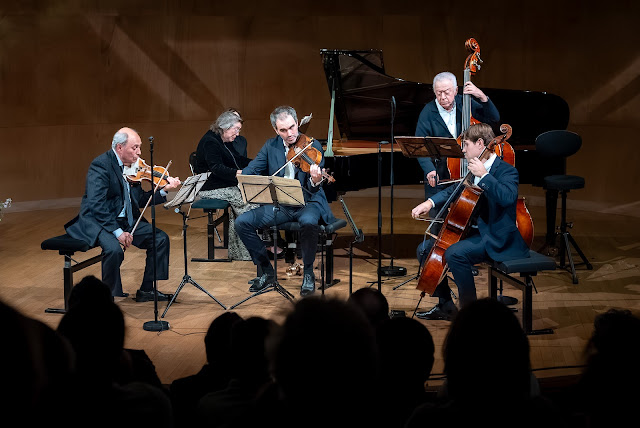 |
| Schubert: Trout Quintet – Mikhail Kopelman, Loïc Rio, Laurent Marfaing, François Kieffer, Grigory Kovalevsky, Elisabeth Leonskaja (Photo © Nathanael Charpentier / © Association La Clé des Portes) |
First concert (presented by Clément Rochefort)
JS Bach: Cello Suite No.3 in C major, Schubert: String Quartet in C
minor (Quartettsatz’) D.703, Villa-Lobos: Bachianas Brasileiras, No.5
(first aria), Alexander Raskatov: Ode for St Valentine’s Day for eight
violoncellos and a bottle of champagne, Dvořák: Piano Quintet No.2 in A
major, Op.81.
Boris Andrianov (cello), Quatuor Van Kuijk, Serafima Liberman (soprano), Ludmila Berlinskaia (piano)
Thursday 16 October: Salle Cortot, Paris
Second concert (presented by Arthur Ancelle and Maria Matalaev)
Beethoven: String Quartet No.1 in F major, Op.18, Shostakovich: Piano Trio No.2 in E minor, Op.67, String Quartet No.9 in E flat major, Op.117, Prelude and Scherzo for String Octet, Op.11
Quatuor Danel, Kazakh State String Quartet, Mikhail Kopelman (violin), Boris Andrianov (cello), Ludmila Berlinskaia (piano)
Friday 17 October: Salle Cortot, Paris
Third concert (presented by Maria Matalaev and Arthur Ancelle)
Haydn: String Quartet No.29 in G major, Op.33, Brahms: Clarinet Trio in A minor, Op.114, Gaziza Zhubanova: String Quartet No.1, Prokofiev: Overture on Hebrew Themes, Op.34
Kazakh State String Quartet, Anastasia Ushakova (cello), Nicolas Baldeyrou (clarinet), Ludmila Berlinskaia (piano).
Saturday 18 October: Salle Cortot, Paris
Fourth concert (presented by Clément Rochefort and Maria Matalaev)
Schubert: Piano Quintet in A major, D.667 (The Trout), Rodion Shchedrin: Diptych for Violin Solo; Glinka: Grand Sextet for Piano and Strings in E flat major – Gran Sestetto originale
Mikhail Kopelman, Dmitry Sitkovetsky, Loïc Rio (violins), Laurent Marfaing (viola), François Kieffer (cello), Grigory Kovalevsky (double-bass), Elisabeth Leonskaja (piano), Ludmila Berlinskaia (piano)
Sunday 19 October: Salle Cortot, Paris
Reviewed by Tony Cooper
An initiative of Valentin Berlinsky’s daughter, Ludmila Berlinskaia, together with her French-born husband, Arthur Ancelle, a couple of prominent international pianists based in Paris, they curated a brilliant and fitting programme in which to honour the memory of Valentin Berlinsky (known to many as ‘Mr Berlinsky’) in the year of his centenary.
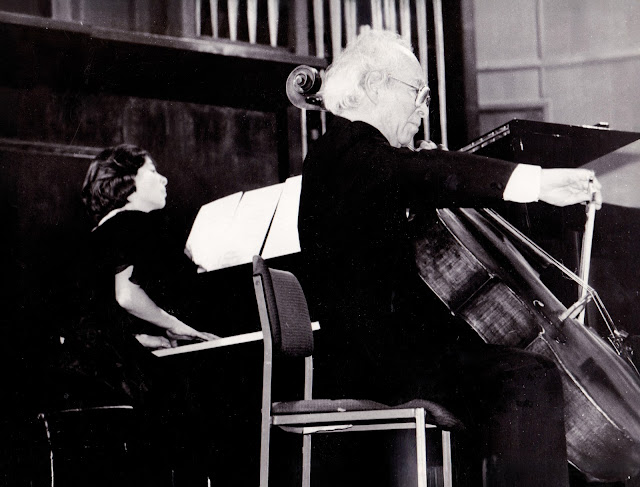 |
| Valentin Berlinsky in concert with his daughter Ludmila Berlinskaia |
One hundred years after his birth, the musical world rightly celebrates the centenary of Valentin Berlinsky (1925-2008), an exceptional and gifted cellist, influential pedagogue, founded the Moscow Conservatoire Quartet whilst a student there in 1944. A decade later it was renamed the Borodin String Quartet in honour of Alexander Borodin, one of the founders of Russian chamber music.
The Borodin Quartet’s cohesion and vision has survived many personnel changes over the years mainly due to the common ground shared by its players from their training at the Moscow Conservatoire while their style is characterised by an almost symphonic volume and a highly developed ability of phrasing thereby creating a unified, connected and consistent sound of tonal beauty and technical excellence largely due to the efforts, wisdom and stewardship, I feel, of Valentin Berlinsky, their cellist for six glorious, adventurous and thrilling decades.
His father, a violinist and pupil of Leopold Auer, was his first teacher: Berlinsky began on the violin before turning to the cello, a transition that came to him with remarkable ease and natural affinity. He then entered the Central Music School in Moscow, studying with E. M. Gendli and went on to the Moscow Conservatoire, from which he graduated in 1947 after studying with S. M. Kozolupov.
Alongside his performing career, Berlinsky taught chamber music first at the Ippolitov-Ivanov Institute (from 1947) and later at the Gnessin School of Music (from 1970) where he trained several generations of musicians and ensembles. He also founded major institutions such as the Dmitri Shostakovich International String Quartet Competition (1987-2004) and the Sakharov Festival in Nizhny Novgorod, a pioneering event combining classical music and human-rights advocacy. He contributed as well to the creation of ProQuartet in France alongside Georges Zeisel.
Becoming one of the Soviet Union’s best-known and revered ensembles in the West during the Communist era (they performed at the funerals of both Stalin and Prokofiev who died on the same day – 5 March 1953) through multiple recordings as well as concert performances in the USA and continental Europe, members of the Borodin Quartet enjoyed a close and flourishing relationship with Shostakovich who personally consulted them on each of his 15 string quartets which they recorded as well as all of Beethoven’s quartets thus becoming widely known throughout the world for the quality and interpretations of both composers’ quartets.
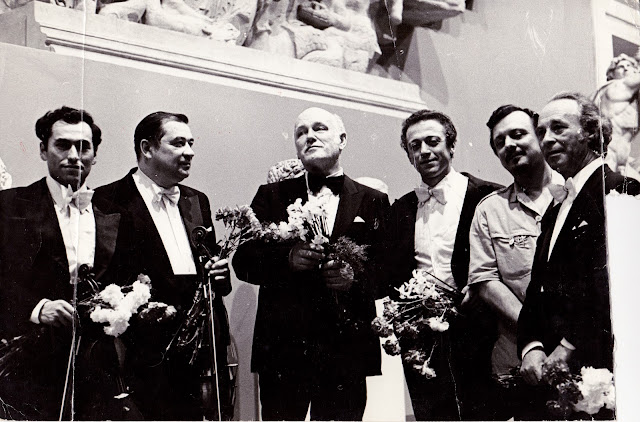 |
| Borodin Quartet with Sviatoslav Richter & Grigory Kovalevsky |
Regularly performing with the likes of violinist Yuri Bashmet and such luminous pianists as Sviatoslav Richter, Elisabeth Leonskaja, Elisso Virssaladze and Maria Yudina, the Borodins originally featured Mstislav Rostropovich on cello but due to pressure of work he stepped aside after a two weeks in favour of Valentin Berlinsky while Rostislav Dubinsky and Vladimir Rabei (first/second violins) and Yuri Nikolaevsky (viola) – all students of Professor Mikhail Terian at the Moscow Conservatoire – comprised members of the Quartet. Interestingly, Rabei and Nikolaevsky were soon succeeded by Rudolf and Nina Barshai.
After a couple of decades with the same line-up, turbulent times came upon the Quartet in the 1970s. Dubinsky defected to the West and second violinist Yaroslav Alexandrov retired due to ill health. Having recruited replacements, Berlinsky insisted that the ensemble spend three months out of public attention until the Borodin sound had been fully restored.
In his 1989 book, Stormy Applause, Dubinsky chronicled disharmony, power struggles and betrayal to the authorities by Berlinsky, who admitted being a Communist Party member, but dismissed the book as being ‘full of half-truths’. Dubinsky went on to form the Borodin String Trio in 1976.
Deservedly so, honours came flooding Mr Berlinsky’s way. For instance, he was made an Officer of the French Legion of Honour in 2006 and was also named a People’s Artist of the Russian Soviet Federative Socialist Republic (RSFSR) in 1974 receiving the USSR State Prize in 1986. Post-Soviet Russia honoured him, too, for meritorious service to the state with the Order for Service to the Fatherland (IV class) in 2000 while the entire Borodin Quartet received the Glinka State Prize of the RSFSR in 1968.
 |
| During the Borodin Quartet’s first tour beyond the Iron Curtain – Venice 1958 |
I’m pleased to say that the Borodins – one of the very few existing established chamber-music ensembles harbouring an uninterrupted longevity – have made five visits to Norwich (my home city in East Anglia) appearing in a couple of important concerts promoted by the Norfolk & Norwich Music Club now renamed Norwich Chamber Music and, thankfully, still going strong.
They performed the complete Beethoven cycle in six concerts over eight days in March 2004 at the John Innes Centre returning in March 2006 to play the Shostakovich cycle in celebration of the composer’s centenary. In fact, Norwich was the only place outside of Moscow where they undertook the Shostakovich cycle.
Returning to Norwich for a Tchaikowsky/Brahms cycle in January 2010, the cellist’s chair was duly occupied by Vladimir Balshin. And for their 25th anniversary visit in April 2015, Mr Berlinsky’s daughter, Ludmila Berlinskaya, joined the Quartet to play Shostakovich’s Piano Quintet in G minor, Op.57.
For their last visit to Norwich (June 2017) the Borodins offered a concert to Roger Rowe to mark his eightieth year which took place on his actual birthday – 6th June. The programme comprised Borodin’s Quartet No.2 and Mozart’s Clarinet Quintet in A major, K.581, featuring Michael Collins.
A major player in promoting chamber music in Norwich, Roger acted as artistic director of Norwich Chamber Music from 1997 to 2017. A good innings, for sure. But unstoppable and full of energy, Roger then went on to found and programme a Thursday lunchtime chamber-music series at Norwich’s Assembly House, a wonderful Georgian-built building in which Franz Liszt performed at in 1840.
Retiring from the Assembly House in 2022, after five years at the helm, Roger’s now highly active promoting chamber music at The Chapel, Park Lane, Norwich, a small intimate venue but one that attracts such prominent musicians as pianist Benjamin Grosvenor, violinist Alina Ibragimova and soprano Elizabeth Watts. The list is endless – just like Ko-Ko’s in The Mikado.
However, to honour Valentin Berlinsky in his centenary year, a four-day celebratory festival (Wednesday 16 to Sunday 19 October) was held in the beautiful setting of the art deco-designed Salle Cortot at 78 rue Cardinet, Île-de-France, named after the French-Swiss pianist, teacher and conductor, Alfred Cortot, who founded the École Normale de Musique de Paris (housing Salle Cortot) with pianist and music critic, Auguste Mangoe, in 1919. Ludmila Berlinskaya has been teaching at the school since 2006.
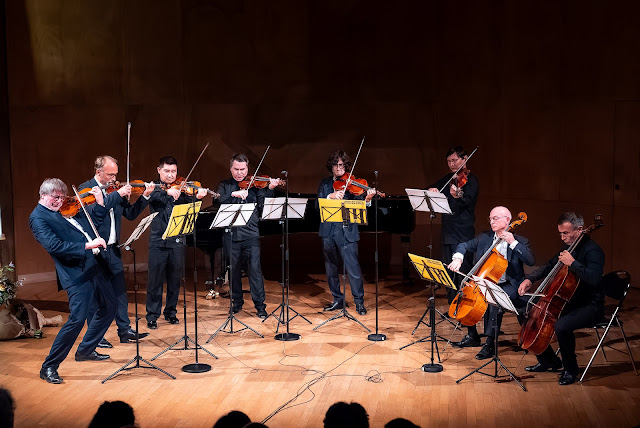 |
| Shostakovich: Prelude and Scherzo for String Octet – Quatuor Danel, Kazakh State String Quartet – (Photo © Nathanael Charpentier / © Association La Clé des Portes) |
The opening event marking the Valentin Berlinsky Centennial (Wednesday 15 October) – held at the international headquarters of the Dmitri Shostakovich Association at 19bis, rue des Saints-Pères, Paris – was an exhibition dedicated to Mr Berlinsky together with a screening of the 40-minute film, Valentin Berlinsky: the soul of the string quartet. There was also a showing of the 40-minute documentary, Conversation à quatre, made in 1982, devoted to the Borodin Quartet, screened in the presence of violinist, Mikhail Kopelman, a valued member of the Quartet for 20 years from 1976.
A further non-musical event took place on Thursday 16 October with a presentation of a revised and expanded edition of Maria Matalaev’s book, The Quartet of a Life (Muses Prize, 2016) launched at Salle Munch (École Normale de Musique de Paris) while the opening concert on the same day (presented by Clément Rochefort) featured the cellist, Boris Andrianov, who delivered a strong and masterful account of JS Bach’s Cello Suite No.3 in C major followed by Quatuor Van Kuijk (Nicolas Van Kuijk [replaced by Da-Min Kim, as he was joyfully detained by the impending birth of his child], Sylvain Favre-Bulle, Emmanuel François, Anthony Kondo) performing an effortless and charming rendition of Schubert’s String Quartet in C minor (Quartettsatz) D.703.
The concert then turned to multiple forces inasmuch as eight alert, talented and ‘rearing-to-go’ young cellists from La Fondation Gautier Capuçon – Miriam Bensaid, Elise Compte, Christina Coppola, Noé Drdak, Léo Ispir, Thomas Rech, Lisa Strauss, Robin de Talhouët – accompanied the young and highly-talented soprano, Serafima Liberman, in the first aria of Villa-Lobos’ well-loved work, Bachianas Brasileiras No. 5. An evocative and beautiful piece, it was warmly sung by Ms Liberman who truly captured the sensitivities and nuances of the composer’s rich and compelling score.
The battalion of cellists remained onstage to play Alexander Raskatov’s Ode for St Valentine’s Day for eight violoncellos and a bottle of champagne in the presence of the composer. He wrote the piece for Mr Berlinsky’s 80th birthday celebrations in a concert held at Moscow’s Tchaikovsky Hall in January 2005 attended by the likes of Mstislav Rostropovich and Yuri Bashmet.
I was glad to be a member of the audience and so, too, was my very good friend, Roger Rowe. I well remember the ending of the concert witnessing 14 string quartets made up by former students of Mr Berlinsky playing renderings of Happy Birthday in varying composers’ style. For instance, Bach, Beethoven, Mozart, Stravinsky and even Johann Strauss and Scott Joplin but the final ‘musical birthday greeting’ was left to Shostakovich who enjoyed a special relationship with Mr Berlinsky from his student days when he studied with him his first quartet.
But ending a rather lovely and entertaining concert fell to Mr Berlinsky’s loving and devoted daughter, Ludmila Berlinskaya, who joined forces with Quatuor Van Kuijk to play a sensitive and rewarding performance of Dvořák’s Piano Quintet No.2 in A major Op.81 whose main subject, exposed by the cello against a uniform rhythmical accompaniment by the piano, provided a very appropriate combination and work for such an auspicious occasion.
And as for the bottle of bubbly, Clément Rochefort pranced about on stage with bottle in hand (courtesy of Le Brun Servenay) although the ‘explosion’ of the cork happened offstage to the amusement of a full and appreciative house. Luckily, though, l enjoyed a couple of well-filled glasses at the post-concert gathering gracefully hosted by Ludmila Berlinskaya.
Presented by Arthur Ancelle and Maria Matalaev, Mr Berlinsky’s granddaughter, the second concert (Friday 17 October) opened in style with Quatuor Danel (Marc Danel, Gilles Milet, Vlad Bogdanas, Yovan Markovitch) performing a thrilling account of Beethoven’s String Quartet No.1 in F major, Op.18, while Shostakovich’s Piano Trio No.2 in E minor, Op.67, followed with Ludmila Berlinskaia seemingly on fire, especially in the work’s cracking and spirited second movement, which lives up to its ‘con brio’ status with its vibrant dance-like patterns and punchy rhythms crackling with immense energy. And playing with the likes of such luminous and gifted musicians as Mikhail Kopelman and Boris Andrianov, Ludmila Berlinskaia delivered a strong and uplifting performance of this well-loved piano trio known for its charm, wit and lyrical beauty.
Returning to the stage, Quatuor Danel then played Shostakovich’s String Quartet No.9 in E flat major, Op.117, while concluding the programme by joining forces with the Kazakh State String Quartet (Aidar Toktaliyev, Alexey Lebedev, Bekzat Sailaubaiuly, Yernar Myntayev) in a stunning performance of Shostakovich’s Prelude and Scherzo for String Octet, Op.11, an early work that found favour with a full and admiring house.
The Kazakh State String Quartet returned to the stage the next day (Saturday 18 October) for the third concert in the series presented by Maria Matalaev and Arthur Ancelle opening the programme with an intelligent reading of Haydn’s String Quartet No.29 in G major, Op.33, before clarinettist, Nicolas Baldeyrou, teamed up with Ludmila Berlinskaia and cellist Anastasia Ushakova offering a rich and tender rendition of Brahms’ Clarinet Trio in A minor, Op.114.
Completing an adventurous, impressive and totally engaging programme, though, fell to Gaziza Zhubanova’s String Quartet No.1 and Prokofiev’s Overture on Hebrew Themes, Op.34, commissioned by a group of Russian-Jewish immigrants written by Prokofiev when living in America. Based on themes from a notebook of Jewish folksongs, the work, scored for clarinet, string quartet and piano, offered generous space for the clarinettist, Nicolas Baldeyrou, to show his prowess of his chosen instrument conjuring up and showing the influence of those rich-sounding, deep-sonorous sounds so closely associated with Klezmer music. As an aside, Gaziza Zhubanova, daughter of composer, Akhmet Zhubanova, studied at the Moscow Conservatoire under Yuri Shaporin and taught at the Kazakh National Conservatory from 1957 while acting as its rector from 1975 to 1987.
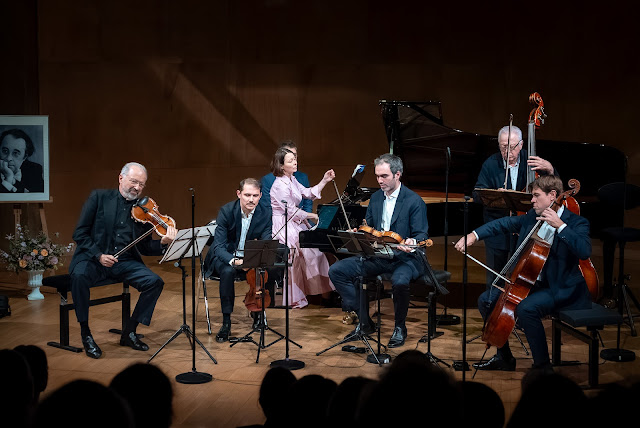 |
| Glinka: Grand Sextet – Mikhail Kopelman, Loïc Rio, Laurent Marfaing, François Kieffer, Grigory Kovalevsky, Ludmila Berlinskaia (Photo © Nathanael Charpentier / © Association La Clé des Portes) |
However, bringing the curtain down on a wonderful, inspiring and eclectic chamber-music series to mark and honour the centenary of Valentin Berlinsky, the fourth concert (Sunday 19 October – presented by Clément Rochefort and Maria Matalaev) got off to a romantic and thrilling start with a fine rendering of Schubert’s Piano Quintet in A major, D.667 (The Trout) featuring the renowned and legendary pianist, Elisabeth Leonskaja, performing a work clearly demonstrating the genius that this well-loved 19th-century composer possessed for melody and lyricism.
The concert continued with Rodion Shchedrin’s Symphonic Diptych, a broken song based on the opera The Enchanted Wanderer, a solo piece played with intensity and feeling by Dmitry Sitkovetsky and dedicated to him and remembering, too, the composer who passed away earlier this year.
A favourite of the Borodins, Glinka’s Grand Sextet for Piano and Strings in E flat major (Gran Sestetto originale) which they have played so many times with so many prestigious pianists including Berlinsky’s daughter Ludmila, offered an appropriate and fitting end to the Valentin Berlinsky Centennial series of concerts and events. The featured musicians were violinists Mikhail Kopelman, Dmitry Sitkovetsky and Loïc Rio, violist Laurent Marfaing, cellist François Kieffer and double-bassist Grigory Kovalevsky and, of course, pianist Ludmila Berlinskaya.
However, as a curtain-raiser to the final concert, a clip from a documentary filmed in 1982 in various places in Russia but mostly in Moscow showed Valentin Berlinsky and Mikhail Kopelman with Dmitri Shebaline (viola) and Andrei Abramenkov (second violin) playing the ‘Nocturne’ from Borodin’s Quartet No.2 in D major.
Without a shadow of doubt, the Valentin Berlinsky Centennial event proved a spirited and lovely occasion and adding a nice touch to the proceedings overall was a large portrait of Mr Berlinsky positioned at the side of the stage adorned by a myriad of flowers that offered respect and admiration from the coterie of players who knew him well. Bravo!
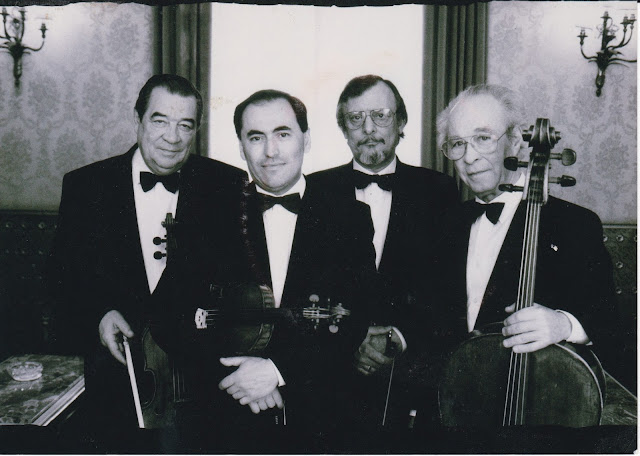 |
| Borodin Quartet (inc violinist Mikhail Kopelman) |
BERLINSKY EXTRA
The rationale behind Ludmila Berlinskaia’s programming was carefully planned and selected around works that her father greatly favoured and dearly loved.
For instance, the first concert reflected Mr Berlinsky’s admiration for Bach, as he often used the cello sonatas as warm-up exercises, while Villa-Lobos’ Bachianas Brasileiras mirrored his love for the human voice. His mother was a contralto, and Berlinsky often said that if he had possessed a good enough voice, he would have become a singer rather than a cellist. The Borodin Quartet frequently performed Schubert’s Quartettsatz as well as Dvořák’s Piano Quintet, most notably with Sviatoslav Richter — with Ludmila acting as page-turner. The connection with Quatuor Van Kuijk stems from the fact that the ensemble benefited from Berlinsky’s masterclasses in their early years, while Alexander Raskatov’s Ode for St Valentine’s Day was written to commemorate Berlinsky’s 80th birthday celebrations in Moscow.
In the second concert, the programme paired Beethoven and Shostakovich — two composers with profound and indelible ties to the Borodin Quartet. The ensemble performed complete cycles of both composers’ quartets around the world (including Norwich, UK), with their first full Shostakovich cycle presented in Kazakhstan and later in Moscow. The participation of Quatuor Danel and the Kazakh State String Quartet in the centennial celebrations reflects their particularly close relationship with Berlinsky, who served as their mentor and coach for many years. Like the Borodin Quartet before them, the Kazakh State Quartet places a special emphasis on performing the works of contemporary and national composers, carrying forward Berlinsky’s legacy of championing new music and sharing it beyond the borders of their homeland.
As Haydn was one of Berlinsky’s favourite composers, the third concert opened with a performance of his String Quartet No. 29 in G major. Berlinsky also often performed Brahms’ Trio with Yuri Bashmet and Mikhail Muntian. The inclusion of a quartet by Kazakhstan-born composer Gaziza Zhubanova, based on traditional folk tunes, underscored Berlinsky’s and the Borodin Quartet’s commitment to introducing new or lesser-known works to audiences as part of their broader artistic philosophy — a spirit that continues today through the Kazakh State Quartet’s dedication to promoting their country’s musical heritage on international stages. Another piece cherished by Berlinsky, Prokofiev’s Overture on Hebrew Themes, was likewise a regular part of the Borodins’ repertoire.
The final concert brought together musicians who shared close artistic or personal ties with Berlinsky and the Borodin Quartet — among them Mikhail Kopelman and Elisabeth Leonskaja, a long-standing friend and collaborator of the ensemble, as well as François Kieffer and members of Quatuor Modigliani, who, like the Quatuor Van Kuijk, once took masterclasses with Berlinsky. One of Berlinsky’s devoted pupils, Grigory Kovalevsky, later became a double bassist and performed with the Borodin Quartet in numerous appearances, notably in Glinka’s Grand Sextet and Schubert’s Trout Quintet, both works Berlinsky held especially dear. Dmitry Sitkovetsky — the son of violinist Julia Sitkovetsky and pianist Bella Davidovich, both friends of Berlinsky — also took part in the celebration. Schubert’s “Trout” Quintet, which Berlinsky performed with countless partners throughout his life, formed a natural highlight, while Rodion Shchedrin’s Diptych for solo violin — played by Sitkovetsky and dedicated to him — paid tribute to the composer, who passed away earlier this year. Finally, Glinka’s Grand Sextet provided an eloquent and fitting conclusion to the Valentin Berlinsky Centennial series.
The blog is free, but I’d be delighted if you were to show your appreciation by buying me a coffee.
Elsewhere on this blog
- Thinking about sound: Grieg’s Lyric Pieces on a modern piano from Alexander Ullmann & on historic pianos with unequal temperament from Ziad Kreidy – record review
- Favourite songs & last words: Schubert weekend in Oxford with Nikola Hillebrand, Julius Drake, Thomas Oliemans & Paolo Giacometti – review
- Gluck Arias: Ann Hallenberg’s latest disc with The Mozartists is the result of her long and fruitful relationship with conductor Ian Page – interview
- Not so slight & surprisingly experimental: the Royal Opera & La Nuova Music bring a touch of 1930s glamour to Handel’s Giustino – opera review
- Berlin Diary: Tony Cooper finds time to fit in a thrilling concert by the Berlin Philharmonic & Daniele Gatti – review
- There was nothing semi- about the performances: we were drawn into this quirky world: ENO’s production of Britten’s Albert Herring – review
- In the moment: John Butt & the OAE explore the glorious richness of Handel’s Solomon as the opener to their anniversary season – review
- Letter from Florida: Stéphane Denève conducts Beethoven’s Eroica – concert review
- Speaking the language of the past: Patrick Ayrton on Astrophil & Stella inspired by the world of English 17th-century composers – interview
- Home




.jpg?w=670&resize=670,446&ssl=1)




